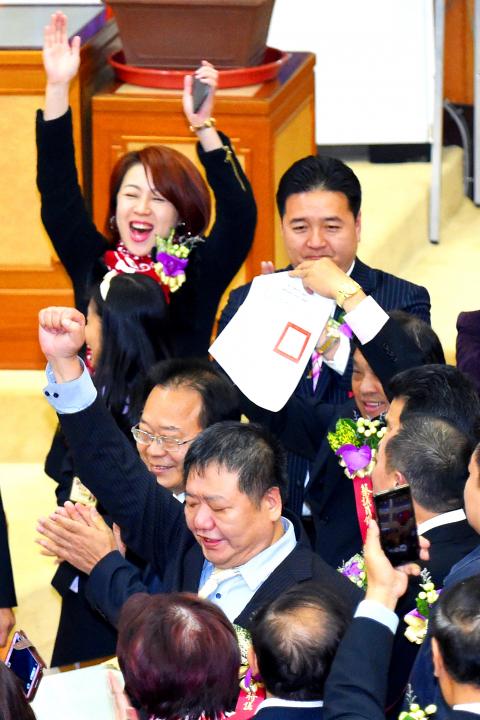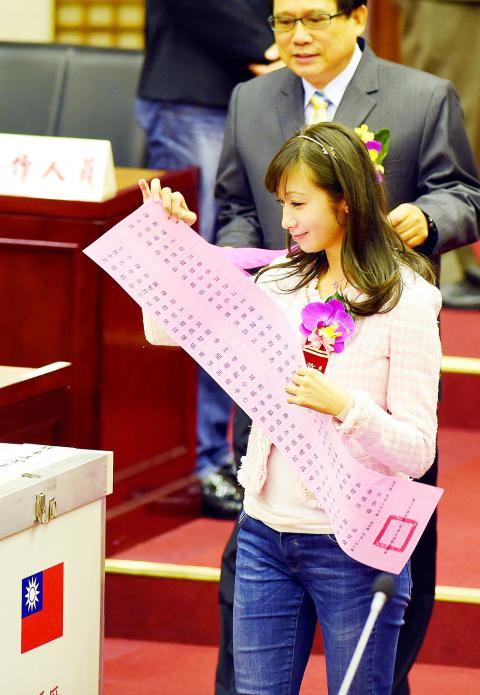On the day of the inauguration of newly elected city, municipality and county heads, 22 councils across the country also voted to choose speakers and deputy speakers.
While the Democratic Progressive Party (DPP) secured the speakers of the Greater Kaohsiung, Yilan County and Chiayi County councils, the Chinese Nationalist Party (KMT) picked up 15, with the remaining four — Hsinchu City, Lienchiang County, Pingtung County and Chiayi City — won by independent councilors.
The Taipei City Council, where the KMT has 28 of the 63 seats and the DPP has 27, is to be presided over by the KMT after the party’s candidate had won by 32 votes to 31 for the DPP’s candidate, while the KMT’s deputy speaker candidate garnered 32 votes to the DPP’s 28.

Photo: Liu Hsin-de, Taipei Times
The New Taipei City Council, which the pan-green camp had expected to win after the DPP threatened to strip the membership of those who did not vote with the party line after 65 years of KMT rule, failed to witness a “color conversion.”
While the DPP has more seats (32) on the New Taipei City Council than the KMT (26), there are seven councilors with no party allegiance and one Taiwan Solidarity Union (TSU) councilor. With TSU Councilor Chang Chin-ting (張晉婷) and a non-affiliated councilor, Chen Shih-rong (陳世榮), being former DPP members, the pan-green camp had expected to have the upper hand in the ballot.
Two rounds of votes, both resulting in a 33-33 tie, were undertaken, before the council finally drew lots, with luck on the side of KMT council speaker candidate Chiang Ken-huang (蔣根煌).

Photo: Liao Chen-huei, Taipei Times
The tie, assuming that all of the DPP councilors toed the party line, indicated that one of the two non-DPP pan-green councilors had not voted as expected.
Chang was rumored to have been the culprit, speculation echoed by DPP Legislator Wu Ping-jui (吳秉叡) and DPP Councilor Liao Hsiao-ching (廖筱清), who directly attributed the loss to the TSU.
The TSU later released a statement saying that the TSU and the DPP had reached a consensus before the vote that the two parties would work together and require their respective party members to toe the party line.
“Following rumors that some [councilors] failed to vote in accordance with party policy, the TSU is to immediately initiate an investigation with the DPP to identify the councilors who breached the agreement and punish them by revoking their party membership,” it said.
Fuming over the outcome of the Tainan City Council vote, the DPP also announced that those who had failed to vote for the party’s own candidates would be severely punished.
To many people’s surprise, the Tainan City Council, where the DPP has a 29-16 advantage over the KMT in terms of seats, selected KMT Councilor Lee Chuan-chiao (李全教) as council speaker, after Lee secured 29 votes to DPP councilor Lai Mei-hui’s (賴美惠) 26.
The DPP said it had expected at least 31 votes, so at least five councilors had not voted as agreed.
DPP Central Review Committee chairman Liu Shih-fang (劉世芳) said that as the party had required all party members to “show their ballots” before putting them in the ballot box as a way to demonstrate their adherence to the party line, “those who failed to do so are seen as the ones who had voted against the party’s candidate and they will face disciplinary action.”
While failing to achieve the expected wins in New Taipei City and Greater Tainan, the DPP did make gains in Greater Kaohsiung and Yilan County, where the party had its speaker candidates elected for the first time in history.
Police installed six surveillance cameras in the Kaohsiung council chamber to monitor the vote and said that those exposing their ballots would be investigated.

US President Donald Trump yesterday announced sweeping "reciprocal tariffs" on US trading partners, including a 32 percent tax on goods from Taiwan that is set to take effect on Wednesday. At a Rose Garden event, Trump declared a 10 percent baseline tax on imports from all countries, with the White House saying it would take effect on Saturday. Countries with larger trade surpluses with the US would face higher duties beginning on Wednesday, including Taiwan (32 percent), China (34 percent), Japan (24 percent), South Korea (25 percent), Vietnam (46 percent) and Thailand (36 percent). Canada and Mexico, the two largest US trading

China's military today said it began joint army, navy and rocket force exercises around Taiwan to "serve as a stern warning and powerful deterrent against Taiwanese independence," calling President William Lai (賴清德) a "parasite." The exercises come after Lai called Beijing a "foreign hostile force" last month. More than 10 Chinese military ships approached close to Taiwan's 24 nautical mile (44.4km) contiguous zone this morning and Taiwan sent its own warships to respond, two senior Taiwanese officials said. Taiwan has not yet detected any live fire by the Chinese military so far, one of the officials said. The drills took place after US Secretary

CHIP EXCEPTION: An official said that an exception for Taiwanese semiconductors would have a limited effect, as most are packaged in third nations before being sold The Executive Yuan yesterday decried US President Donald Trump’s 32 percent tariff on Taiwanese goods announced hours earlier as “unfair,” saying it would lodge a representation with Washington. The Cabinet in a statement described the pledged US tariffs, expected to take effect on Wednesday next week, as “deeply unreasonable” and “highly regrettable.” Cabinet spokeswoman Michelle Lee (李慧芝) said that the government would “lodge a solemn representation” with the US Trade Representative and continue negotiating with Washington to “ensure the interests of our nation and industries.” Trump at a news conference in Washington on Wednesday announced a 10 percent baseline tariff on most goods

THUGGISH BEHAVIOR: Encouraging people to report independence supporters is another intimidation tactic that threatens cross-strait peace, the state department said China setting up an online system for reporting “Taiwanese independence” advocates is an “irresponsible and reprehensible” act, a US government spokesperson said on Friday. “China’s call for private individuals to report on alleged ‘persecution or suppression’ by supposed ‘Taiwan independence henchmen and accomplices’ is irresponsible and reprehensible,” an unnamed US Department of State spokesperson told the Central News Agency in an e-mail. The move is part of Beijing’s “intimidation campaign” against Taiwan and its supporters, and is “threatening free speech around the world, destabilizing the Indo-Pacific region, and deliberately eroding the cross-strait status quo,” the spokesperson said. The Chinese Communist Party’s “threats